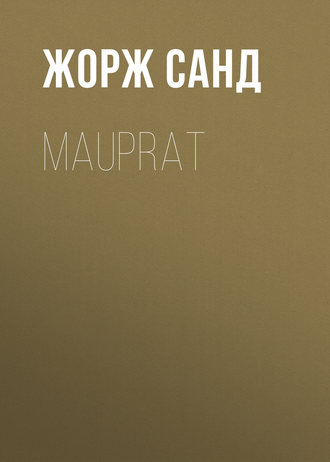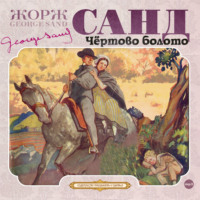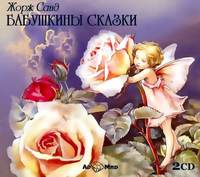 полная версия
полная версияMauprat
It was not so long ago that the last of the Mauprats, the heir to this property, had the roofing taken away and all the woodwork sold. Then, as if to give a kick to the memory of his ancestors, he ordered the entrance gate to be thrown down, the north tower to be gutted, and a breach to be made in the surrounding wall. This done, he departed with his workmen, shaking the dust from off his feet, and abandoning his domain to foxes, and cormorants, and vipers. Since then, whenever the wood-cutters and charcoal-burners from the huts in the neighbourhood pass along the top of the Roche-Mauprat ravine, if it is in daytime they whistle with a defiant air or hurl a hearty curse at the ruins; but when day falls and the goat-sucker begins to screech from the top of the loopholes, wood-cutter and charcoal-burner pass by silently, with quickened step, and cross themselves from time to time to ward off the evil spirits that hold sway among the ruins.
For myself, I own that I have never skirted the ravine at night without feeling a certain uneasiness; and I would not like to swear that on some stormy nights I have not given my horse a touch of the spur, in order to escape the more quickly from the disagreeable impression this neighbourhood made on me.
The reason is that in childhood I classed the name of Mauprat with those of Cartouche and Bluebeard; and in the course of horrible dreams I often used to mix up the ancient legends of the Ogre and the Bogey with the quite recent events which in our province had given such a sinister lustre to this Mauprat family.
Frequently, out shooting, when my companions and I have left our posts to go and warm ourselves at the charcoal fires which the workmen keep up all night, I have heard this name dying away on their lips at our approach. But when they had recognised us and thoroughly satisfied themselves that the ghosts of none of these robbers were hiding in our midst, they would tell us in a whisper such stories as might make one’s hair stand on end, stories which I shall take good care not to pass on to you, grieved as I am that they should ever have darkened and pained my own memory.
Not that the story I am about to tell is altogether pleasant and cheerful. On the contrary, I must ask your pardon for unfolding so sombre a tale. Yet, in the impression which it has made on myself there is something so consoling and, if I may venture the phrase, so healthful to the soul, that you will excuse me, I hope, for the sake of the result. Besides this is a story which has just been told to me. And now you ask me for one. The opportunity is too good to be missed for one of my laziness or lack of invention.
It was only last week that I met Bernard Mauprat, the last of the line, the man who, having long before severed himself from his infamous connections, determined to demolish his manor as a sign of the horror aroused in him by the recollections of childhood. This Bernard is one of the most respected men in the province. He lives in a pretty house near Chateauroux, in a flat country. Finding myself in the neighbourhood, with a friend of mine who knows him, I expressed a wish to be introduced; and my friend, promising me a hearty welcome, took me to his house then and there.
I already knew in outline the remarkable history of this old man; but I had always felt a keen desire to fill in the details, and above all to receive them from himself. For me, the strange destiny of the man was a philosophical problem to be solved. I therefore noticed his features, his manners, and his home with peculiar interest.
Bernard Mauprat must be fully eighty-four, though his robust health, his upright figure, his firm step, and the absence of any infirmity might indicate some fifteen or twenty years less. His face would have appeared to me extremely handsome, had not a certain harshness of expression brought before my eyes, in spite of myself, the shades of his fathers. I very much fear that, externally at all events, he must resemble them. This he alone could have told us; for neither my friend nor myself had known any other Mauprat. Naturally, however, we were very careful not to inquire.
It struck us that his servants waited on him with a promptitude and punctuality quite marvellous in Berrichon domestics. Nevertheless, at the least semblance of delay he raised his voice, knitted his eyebrows (which still showed very black under his white hair), and muttered a few expressions of impatience which lent wings even to the slowest. At first I was somewhat shocked at this habit; it appeared to savour rather too strongly of the Mauprats. But the kindly and almost paternal manner in which he spoke to them a moment later, and their zeal, which seemed so distinct from fear, soon reconciled me to him. Towards us, moreover, he showed an exquisite politeness, and expressed himself in the choicest terms. Unfortunately, at the end of dinner, a door which had been left open and through which a cold air found its way to his venerable skull, drew from him such a frightful oath that my friend and I exchanged a look of surprise. He noticed it.
“I beg your pardon, gentlemen,” he said. “I am afraid you find me an odd mixture. Ah, you see but a short distance. I am an old branch, happily torn from a vile trunk and transplanted into good soil, but still knotted and rough like the wild holly of the original stock. I have, believe me, had no little trouble in reaching the state of comparative gentleness and calm in which you behold me. Alas! if I dared, I should reproach Providence with a great injustice – that of having allotted me a life as short as other men’s. When one has to struggle for forty or fifty years to transform one’s self from a wolf into a man, one ought to live a hundred years longer to enjoy one’s victory. Yet what good would that do me?” he added in a tone of sadness. “The kind fairy who transformed me is here no more to take pleasure in her work. Bah! it is quite time to have done with it all.”
Then he turned towards me, and, looking at me with big dark eyes, still strangely animated, said:
“Come, my dear young man; I know what brings you to see me; you are curious to hear my history. Draw nearer the fire, then. Mauprat though I am, I will not make you do duty for a log. In listening you are giving me the greatest pleasure you could give. Your friend will tell you, however, that I do not willingly talk of myself. I am generally afraid of having to deal with blockheads, but you I have already heard of; I know your character and your profession; you are an observer and narrator – in other words, pardon me, inquisitive and a chatterbox.”
He began to laugh, and I made an effort to laugh too, though with a rising suspicion that he was making game of us. Nor could I help thinking of the nasty tricks that his grandfather took a delight in playing on the imprudent busybodies who called upon him. But he put his arm through mine in a friendly way, and making me sit down in front of a good fire, near a table covered with cups —
“Don’t be annoyed,” he said. “At my age I cannot get rid of hereditary sarcasm; but there is nothing spiteful in mine. To speak seriously, I am delighted to see you and to confide in you the story of my life. A man as unfortunate as I have been deserves to find a faithful biographer to clear his memory from all stain. Listen, then, and take some coffee.”
I offered him a cup in silence. He refused it with a wave of the arm and a smile which seemed to say, “That is rather for your effeminate generation.”
Then he began his narrative in these words:
I
You live not very far from Roche-Mauprat, and must have often passed by the ruins. Thus there is no need for me to describe them. All I can tell you is that the place has never been so attractive as it is now. On the day that I had the roof taken off, the sun for the first time brightened the damp walls within which my childhood was passed; and the lizards to which I have left them are much better housed there than I once was. They can at least behold the light of day and warm their cold limbs in the rays of the sun at noon.
There used to be an elder and a younger branch of the Mauprats. I belong to the elder. My grandfather was that old Tristan de Mauprat who ran through his fortune, dishonoured his name, and was such a blackguard that his memory is already surrounded by a halo of the marvelous. The peasants still believe that his ghost appears, either in the body of a wizard who shows malefactors the way to the dwellings of Varenne, or in that of an old white hare which reveals itself to people meditating some evil deed. When I came into the world the only living member of the younger branch was Monsieur Hubert de Mauprat, known as the chevalier, because he belonged to the Order of the Knights of Malta; a man just as good as his cousin was bad. Being the youngest son of his family, he had taken the vow of celibacy; but, when he found himself the sole survivor of several brothers and sisters, he obtained release from his vow, and took a wife the year before I was born. Rumour says that before changing his existence in this way he made strenuous efforts to find some descendant of the elder branch worthy to restore the tarnished family name, and preserve the fortune which had accumulated in the hands of the younger branch. He had endeavoured to put his cousin Tristan’s affairs in order, and had frequently paid off the latter’s creditors. Seeing, however, that the only effect of his kindness was to encourage the vices of the family, and that, instead of respect and gratitude, he received nothing but secret hatred and churlish jealousy, he abandoned all attempts at friendship, broke with his cousins, and in spite of his advanced age (he was over sixty), took a wife in order to have heirs of his own. He had one daughter, and there his hopes of posterity ended; for soon afterward his wife died of a violent illness which the doctors called iliac passion. He then left that part of the country and returned but rarely to his estates. These were situated about six leagues from Roche-Mauprat, on the borders of the Varenne du Fromental. He was a prudent man and a just, because he was cultured, because his father had moved with the spirit of his century, and had had him educated. None the less he had preserved a firm character and an enterprising mind, and, like his ancestors, he was proud of hearing as a sort of surname the knightly title of Headbreaker, hereditary in the original Mauprat stock. As for the elder branch, it had turned out so badly, or rather had preserved from the old feudal days such terrible habits of brigandage, that it had won for itself the distinctive title of Hamstringer. [I hazard “Headbreaker” and “Hamstringer” as poor equivalents for the “Casse-Tete” and “Coupe-Jarret” of the French. – TR.] Of the sons of Tristan, my father, the eldest, was the only one who married. I was his only child. Here it is necessary to mention a fact of which I was long ignorant. Hubert de Mauprat, on hearing of my birth, begged me of my parents, undertaking to make me his heir if he were allowed absolute control over my education. At a shooting-party about this time my father was killed by an accidental shot, and my grandfather refused the chevalier’s offer, declaring that his children were the sole legitimate heirs of the younger branch, and that consequently he would resist with all his might any substitution in my favour. It was then that Hubert’s daughter was born. But when, seven years later, his wife died leaving him this one child, the desire, so strong in the nobles of that time, to perpetuate their name, urged him to renew his request to my mother. What her answer was I do not know; she fell ill and died. The country doctors again brought in a verdict of iliac passion. My grandfather had spent the last two days she passed in this world with her.
Pour me out a glass of Spanish wine; for I feel a cold shiver running through my body. It is nothing serious – merely the effect that these early recollections have on me when I begin to narrate them. It will soon pass off.
He swallowed a large glass of wine, and we did the same; for a sensation of cold came upon us too as we gazed at his stern face and listened to his brief, abrupt sentences. He continued:
Thus at the age of seven I found myself an orphan. My grandfather searched my mother’s house and seized all the money and valuables he could carry away. Then, leaving the rest, and declaring he would have nothing to do with lawyers, he did not even wait for the funeral, but took me by the collar and flung me on to the crupper of his horse, saying: “Now, my young ward, come home with me; and try to stop that crying soon, for I haven’t much patience with brats.” In fact, after a few seconds he gave me such hard cuts with his whip that I stopped crying, and, withdrawing myself like a tortoise into my shell, completed the journey without daring to breathe.
He was a tall old man, bony and cross-eyed. I fancy I see him now as he was then. The impression that evening made on me can never be effaced. It was a sudden realization of all the horrors which my mother had foreshadowed when speaking of her execrable father-in-law and his brigands of sons. The moon, I remember, was shining here and there through the dense foliage of the forest. My grandfather’s horse was lean, hardy, and bad-tempered like himself. It kicked at every cut of the whip, and its master gave it plenty. Swift as an arrow it jumped the ravines and little torrents which everywhere intersect Varenne in all directions. At each jump I lost my balance, and clung in terror to the saddle or my grandfather’s coat. As for him, he was so little concerned about me that, had I fallen, I doubt whether he would have taken the trouble to pick me up. Sometimes, noticing my terror, he would jeer at me, and, to make me still more afraid, set his horse plunging again. Twenty times, in a frenzy of despair, I was on the point of throwing myself off; but the instinctive love of life prevented me from giving way to the impulse. At last, about midnight, we suddenly stopped before a small pointed gate, and the drawbridge was soon lifted behind us. My grandfather took me, bathed in a cold sweat as I was, and threw me over to a great fellow, lame and horribly ugly, who carried me into the house. This was my Uncle John, and I was at Roche-Mauprat.
At that time my grandfather, along with his eight sons, formed the last relic in our province of that race of petty feudal tyrants by which France had been overrun and harassed for so many centuries. Civilization, already advancing rapidly towards the great convulsion of the Revolution, was gradually stamping out the systematic extortions of these robbers. The light of education, a species of good taste reflected, however dimly, from a polished court, and perhaps a presentiment of the impending terrible awakening of the people, were spreading through the castles and even through the half-rustic manors of the lordlings. Ever in our midland provinces, the most backward by reason of their situation, the sentiment of social equality was already driving out the customs of a barbarous age. More than one vile scapegrace had been forced to reform, in spite of his privileges; and in certain places where the peasants, driven to desperation, had rid themselves of their overlord, the law had not dreamt of interfering, nor had the relatives dared to demand redress.
In spite of the prevailing tone of mind, my grandfather had long maintained his position in the country without experiencing any opposition. But, having had a large family, endowed like himself with a goodly number of vices, he finally found himself pestered and besieged by creditors who, instead of being frightened by his threats, as of old, were themselves threatening to make him suffer. He was obliged to devise some means of avoiding the bailiffs on the one hand, and, on the other, the fights which were continually taking place. In these fights the Mauprats no longer shone, despite their numbers, their complete union, and their herculean strength; since the whole population of the district sided with their opponents and took upon itself the duty of stoning them. So, rallying his progeny around him, as the wild boar gathers together its young after a hunt, Tristan withdrew into his castle and ordered the drawbridge to be raised. Shut up with him were ten or twelve peasants, his servants, all of them poachers or refugees, who like himself had some interest in “retiring from the world” (his own expression), and in finding a place of safety behind good stout walls. An enormous pile of hunting weapons, duck-guns, carbines, blunderbusses, spears, and cutlasses, were raised on the platform, and the porter received orders never to let more than two persons at a time approach within range of his gun.
From that day Mauprat and his sons broke with all civil laws as they had already broken with all moral laws. They formed themselves into a band of adventurers. While their well-beloved and trusty poachers supplied the house with game, they levied illegal taxes on the small farms in the neighbourhood. Now, without being cowards (and they are far from that), the peasants of our province, as you know, are meek and timid, partly from listlessness, partly from distrust of the law, which they have never understood, and of which even to this day they have but a scanty knowledge. No province of France has preserved more old traditions or longer endured the abuses of feudalism. Nowhere else, perhaps, has the title of the lord of the manor been handed down, as hitherto with us, to the owners of certain estates; and nowhere is it so easy to frighten the people with reports of some absurd and impossible political event. At the time of which I speak the Mauprats, being the only powerful family in a district remote from towns and cut off from communication with the outside world, had little difficulty in persuading their vassals that serfdom was about to be re-established, and that it would go hard with all who resisted. The peasants hesitated, listened timorously to the few among themselves who preached independence, then thought the matter over and decided to submit. The Mauprats were clever enough not to demand money of them, for money is what the peasant in such a district obtains with the greatest difficulty, and parts from with the greatest reluctance. “Money is dear,” is one of his proverbs, because in his eyes money stands for something different from manual labour. It means traffic with men and things outside his world, an effort of foresight or circumspection, a bargain, a sort of intellectual struggle, which lifts him out of his ordinary heedless habits; it means, in a word, mental labour, and this for him is the most painful and the most wearing.
The Mauprats, knowing how the ground lay, and having no particular need of money any longer, since they had repudiated their debts, demanded payments in kind only. They ruled that one man should contribute capons, another calves, a third corn, a fourth fodder, and so on. They were careful, too, to tax judiciously, to demand from each the commodity he could provide with least inconvenience to himself. In return they promised help and protection to all; and up to a certain point they kept their word. They cleared the land of wolves and foxes, gave a welcome and a hiding-place to all deserters, and helped to defraud the state by intimidating the excise officers and tax-collectors.
They took advantage of their power to give the poor man a false notion of his real interests, and to corrupt the simple folk by undermining all sense of their dignity and natural liberty. They made the whole district combine in a sort of secession from the law, and they so frightened the functionaries appointed to enforce respect for it, that after a few years it fell into a veritable desuetude. Thus it happened that, while France at a short distance from this region was advancing with rapid strides towards the enfranchisement of the poorer classes, Varenne was executing a retrograde march and returning at full speed to the ancient tyranny of the country squires. It was easy enough for the Mauprats to pervert these poor folk; they feigned a friendly interest in them to mark their difference from the other nobles in the province whose manners still retained some of the haughtiness of their ancient power. Above all, my grandfather lost no opportunity of making the peasants share his own hatred of his own cousin, Hubert de Mauprat. The latter, whenever he interviewed his vassals, would remain seated in his arm-chair, while they stood before him bareheaded; whereas Tristan de Mauprat would make them sit down at his table, and drink some of the wine they had brought him as a sign of voluntary homage. He would then have them led home by his men in the middle of the night, all dead drunk, torches in hand, and making the forest resound with ribald songs. Libertinism completed the demoralization of the peasantry. In every family the Mauprats soon had their mistresses. This was tolerated, partly because it was profitable, and partly (alas! that it should have to be said) because it gratified vanity. The very isolation of the houses was favourable to the evil. No scandal, no denunciation were to be feared. The tiniest village would have been sufficient for the creation and maintenance of a public opinion. There, however, there were only scattered cottages and isolated farms; wastes and woods so separated the families from one another that the exercise of any mutual control was impossible. Shame is stronger than conscience. I need not tell you of all the bonds of infamy that united masters and slaves. Debauchery, extortion, and fraud were both precept and example for my youth, and life went on merrily. All notions of justice were scoffed at; creditors were defrauded of both interest and capital; any law officer who ventured to serve a summons received a sound thrashing, and the mounted police were fired on if they approached too near the turrets. A plague on parliament; starvation to all imbued with the new philosophy; and death to the younger branch of the Mauprats – such were the watchwords of these men who, to crown all, gave themselves the airs of knights-errant of the twelfth century. My grandfather talked of nothing but his pedigree and the prowess of his ancestors. He regretted the good old days when every lordling had instruments of torture in his manor, and dungeons, and, best, of all cannon. In ours we only had pitchforks and sticks, and a second-rate culverin which my Uncle John used to point – and point very well, in fact – and which was sufficient to keep at a respectful distance the military force of the district.
II
Old Mauprat was a treacherous animal of the carnivorous order, a cross between a lynx and a fox. Along with a copious and easy flow of language, he had a veneer of education which helped his cunning. He made a point of excessive politeness, and had great powers of persuasion, even with the objects of his vengeance. He knew how to entice them to his castle, where he would make them undergo frightful ill-treatment, for which, however, having no witnesses, they were unable to obtain redress by law. All his villainies bore the stamp of such consummate skill that the country came to view them with a sort of awe akin to respect. No one could ever catch him out of his den, though he issued forth often enough, and apparently without taking many precautions. In truth, he was a man with a genius for evil; and his sons, bound to him by no ties of affection, of which, indeed, they were incapable, yet acknowledged the sway of this superior evil genius, and gave him a uniform and ready obedience, in which there was something almost fanatic. He was their deliverer in all desperate cases; and when the weariness of confinement under our chilly vaults began to fill them with ennui, his mind, brutal even in jest, would cure them by arranging for their pleasure shows worthy of a den of thieves. Sometimes poor mendicant monks collecting alms would be terrified or tortured for their benefit; their beards would be burned off, or they would be lowered into a well and kept hanging between life and death until they had sung some foul song or uttered some blasphemy. Everybody knows the story of the notary who was allowed to enter in company with his four clerks, and whom they received with all the assiduity of pompous hospitality. My grandfather pretended to agree with a good grace to the execution of their warrant, and politely helped them to make an inventory of his furniture, of which the sale had been decreed. After this, when dinner was served and the king’s men had taken their places at table, he said to the notary:









